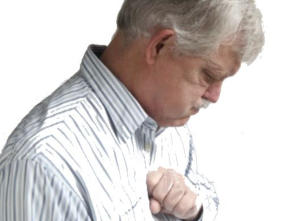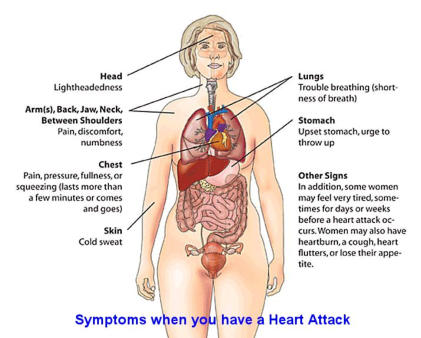


Heartburn or Heart attack: When to worry
Severe heartburn and heart attack can be hard to tell apart. If you have just eaten a big
meal and feel a burning sensation in your chest you would probably think that it is
heartburn. There is however a chance that the chest pain is because of angina or an
actual heart attack.
How much do the symptoms of heartburn and heart attack overlap?
Heartburn, angina and heart attack may feel very much alike. Even experienced doctors
can't always tell the difference from your medical history and a physical exam. That's
why if you go to the emergency room because of chest pain, you'll immediately have
tests to rule out a heart attack.
What's the best thing to do if you have chest pain and you're not sure what's causing it?
What is heartburn?
Heartburn is discomfort or actual pain caused by digestive acid moving into the tube that carries swallowed food to your stomach (esophagus).
Typical features of heartburn include:
•
A burning sensation starting in the upper abdomen and moving up into the chest
•
Usually occurs after eating or while lying down or bending over
•
May awaken you from sleep, especially if you have just eaten before going to bed eaten
•
Usually relieved by antacids
•
May be accompanied by a sour taste in your mouth — especially when you're lying down
•
May be accompanied by a small amount of stomach contents rising up into the back of your throat (regurgitation).
What signs and symptoms are more likely to occur with a heart attack than with heartburn?
It is said that a heart attack involves sudden, crushing chest pain and difficulty breathing, often brought on by exertion. Many heart attacks don't
happen that way, though. The signs and symptoms of a heart attack vary greatly from person to person.
Typical heart attack signs and symptoms include:
•
Pressure, tightness, pain, or a squeezing or aching
sensation in your chest or arms that may spread to your
neck, jaw or back
•
Nausea, indigestion, heartburn or abdominal pain
•
Shortness of breath
•
Sweating
•
Tiredness, Lightheadedness or sudden Dizziness.
The most common symptom of heart attack for both men and
women is chest pain or discomfort. But women are more likely than
men to experience some of the other symptoms, such as jaw or
back pain, shortness of breath, and nausea or vomiting.
Heart problems are more common among people over age 50,
particularly those who have high blood pressure, diabetes or high
cholesterol. Smoking and being overweight are other risk factors.
Can other digestive symptoms cause chest pain?
•
A muscle spasm in your esophagus may cause chest pain similar to that of a heart attack.


Information for the General Public